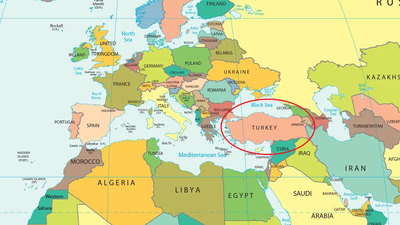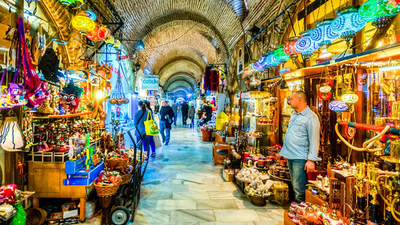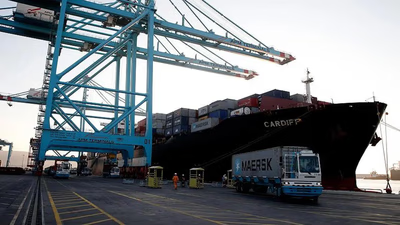
Turkey"s key export markets include Germany and the UK. "
Germany is one of the largest export markets for Turkey. Machinery, automotive parts, textiles, and chemicals are among the key export products to Germany. The United Kingdom is an important trading partner for Turkey, with exports including textiles, automotive parts, machinery, and electrical equipment. Iraq is a significant export destination for Turkish products, particularly construction materials, food products, textiles, and machinery. The United States is an important market for Turkish exports, including textiles, automotive parts, machinery, and jewelry. Italy is a major trading partner for Turkey, with exports primarily consisting of textiles, automotive parts, machinery, and chemicals.
It is safe to say that Turkey exports the most to EU countries. Of course, the use of Turkish products is very common among the countries of the world. Of course, keep in mind that in the whole of the European Union, and especially in countries like Germany, Turks are a very important element of the population of that society. That is, it can be clearly stated that Europe is inconceivable without the Turks. But the first ranks can be considered based on statistics from the following countries:
- Germany
Germany not only has the largest percentage of imports from Turkey but also in terms of demographics, 3.5 million Turks live in Germany. These people play an important economic, political, and social role in Europe and Germany. In terms of exports from Turkey in 2011, which amounted to 13 billion dollars, in 2017 increased to 1.15 billion dollars. Which is expected to reach over $ 18 billion a year this year. Keep in mind that the German demographic context has certainly had a significant impact in this regard. - England
One of the largest products in the top of Turkish exports to the UK is automobiles. Of course, exports to the UK do not only include cars, but also home appliances, furniture, textiles, and clothing. Consider that Turkey could export up to $ 11 billion this year. - United Arab Emirates
Among the Arab countries, the United Arab Emirates ranks first in imports from Turkey. This amount was announced in 2017 amounting to $ 2.9 billion. This year, however, the figure has reached more than $ 11 billion. - Iraq
Among Turkey's neighbors, Iraq leads in exports. It can be seen that the figure was over 10 billion dollars. - United States of America
The United States is also on the list of countries that import a variety of products from Turkey every year. In the list of Turkish exports to the United States, machine parts, cement, copper and plastics have the highest percentage, so that the value of exports to Germany reaches 10 billion dollars a year. - Italy
Italy is one of the countries that imports over $ 10 billion annually from Turkey. Of course, most of Turkey's exports to Italy are automotive and textile products. - France
Exports to France included car parts, plastics, and chemicals worth more than $ 8 billion a year.
France imports various Turkish products, including textiles, automotive parts, machinery, and electrical equipment. Spain is an important export destination for Turkish goods, particularly textiles, automotive parts, machinery, and food products. The Netherlands imports a range of Turkish products, including textiles, machinery, automotive parts, and chemicals. Russia is a significant export market for Turkey, with exports consisting of textiles, food products, machinery, and chemicals. Saudi Arabia imports a variety of goods from Turkey, including textiles, construction materials, food products, and machinery.
-

Turkey"s strategic geographical location at the crossroads of Europe and Asia enhances its role in international trade, particularly in the Middle East. Bordered by several countries and seas, Turkey serves as a vital transit point for goods and energy. The Turkish economy is diverse, with significant contributions from agriculture, manufacturing, and services. It ranks 13th globally in purchasing power parity and has a rapidly growing private sector that plays a crucial role in banking, transport, and communications. The automotive industry is notable, with Turkey being the 14th largest automaker worldwide. Additionally, Turkish brands are prominent in consumer electronics across Europe. The country has successfully modernized its industries to cater to both European and Middle Eastern markets, leading to substantial imports from nations like Iran and Iraq. This dynamic economic landscape positions Turkey as a key player in regional trade networks. "
-

Travelers leaving Turkey must ensure their passport is valid for at least six months beyond their departure date to avoid complications. It"s crucial to check the validity of any visa or residence permit, as overstaying can lead to fines or restrictions. Understanding customs regulations is essential, particularly regarding the export of goods, artifacts, and souvenirs. The value of gifts and souvenirs should not exceed five thousand liras; otherwise, they are subject to special export rules. For those leaving permanently, notifying authorities about the cancellation of residence permits is necessary. Settling all financial obligations before departure is also important. Travelers should carry official invoices for purchased goods to facilitate customs checks and avoid issues with customs officials. Additionally, awareness of duty-free allowances in the destination country is vital, as exceeding these limits may require declarations and payment of duties.
Prohibited items such as illegal drugs and weapons must not be carried when leaving Turkey. Lastly, understanding the specific regulations related to the mode of transportation used for departure—whether by air, sea, or land—is essential for a smooth exit. "
-

Turkey"s transport infrastructure is extensive and continually improving, featuring a well-maintained road network that connects major cities. The railway system primarily focuses on freight but also offers passenger services, with significant investments in high-speed rail lines. Turkey boasts 98 airports, including 22 international ones, with Istanbul"s new airport aiming to be the world"s largest. Turkish Airlines has expanded its global reach significantly. Customs regulations for imports and exports are in place, particularly concerning goods valued over €1,500 and currency export limits. The country also has a robust public transportation system in major cities and a significant maritime transport network supported by numerous ports. Notable infrastructure projects include iconic bridges and tunnels that enhance connectivity across the region. "
-

Turkey is a significant player in global exports, particularly in the automotive, textile, and agricultural sectors. The country ranks among the largest automotive producers in Europe, with major brands like Ford and Renault establishing manufacturing facilities. The textile industry is another cornerstone of Turkey"s export economy, known for its quality and diversity, making it a key supplier to Europe. Agricultural exports are robust, including fresh produce and processed goods, contributing to Turkey"s status as a leading exporter in the EU. In 2018, Turkey"s exports reached $156 billion, marking a 10. 22% increase from the previous year. The jewelry sector also thrives, recognized for its craftsmanship and unique designs. Home appliances have seen significant growth as well, with brands like Beko gaining traction in European markets.
Additionally, Turkey"s machinery and steel industries contribute to its diverse export portfolio. Overall, Turkey"s strategic investments across various sectors have enabled it to diversify its export offerings effectively. "
-

Turkey"s export landscape is dominated by key markets such as Germany, the UK, and Iraq. Germany stands out as the largest importer, with Turkish exports reaching over $18 billion annually, driven by a significant Turkish population contributing to economic ties. The UK follows closely, with exports including automobiles and textiles projected to hit $11 billion. The United Arab Emirates has seen a remarkable increase in imports from Turkey, surpassing $11 billion this year. Iraq remains a crucial neighbor for Turkish exports, particularly in construction materials and textiles, with figures exceeding $10 billion. The United States also plays a vital role in Turkey"s export economy, importing machinery and textiles worth around $10 billion. Other notable markets include Italy and France, each importing over $10 billion in various products like automotive parts and chemicals. This diverse export portfolio highlights Turkey"s strategic position in global trade networks across Europe and the Middle East. "





